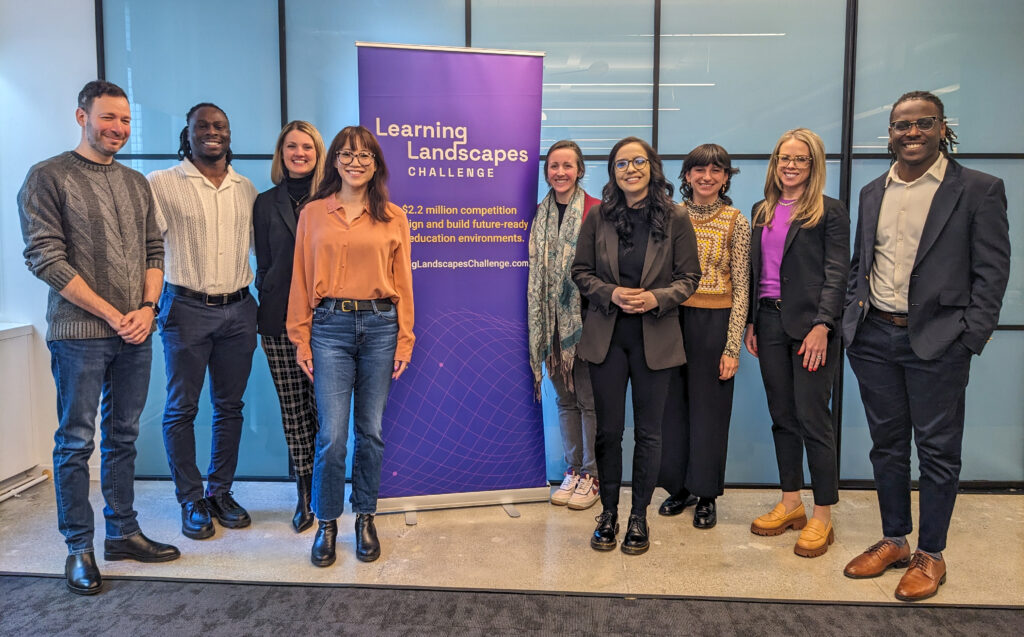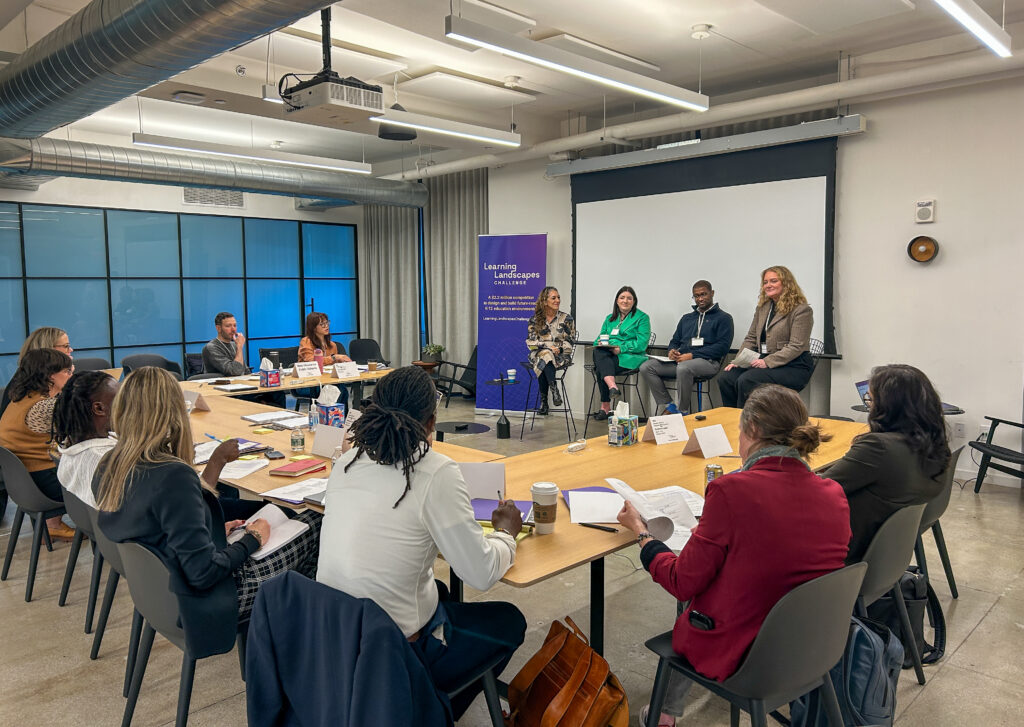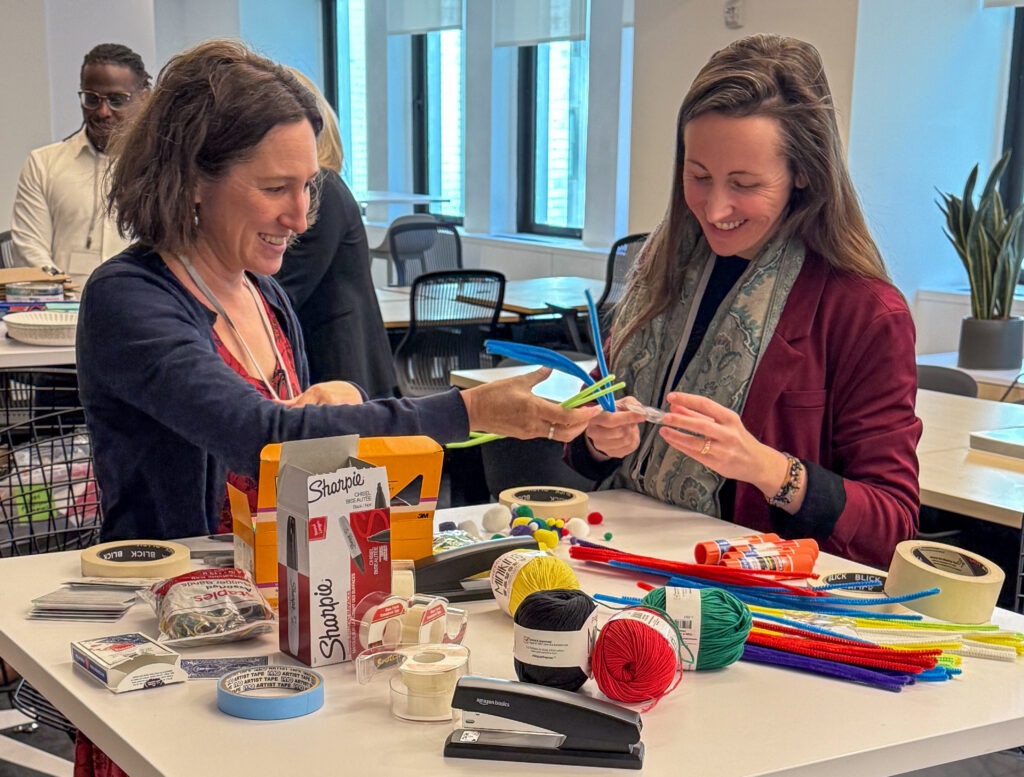
This January, the five Phase 3 teams converged in New York City for a boot camp launching the final phase of the Learning Landscapes Challenge. Over two intensive days, the teams alternated between larger group sessions and focused breakout meetings with expert mentors, covering topics from prototyping and sustainability to infrastructure delivery and storytelling. The boot camp marked an early milestone in a 6-month virtual incubator, during which the Phase 3 teams are receiving customized support as they prototype and implement their infrastructure solutions.
The sessions covered a range of topics — from strategies for prototyping complex systems to approaches to sustainable scaling. The two days of conversation and collaboration also highlighted how the challenge is helping build a community of innovators at the intersection of infrastructure and education. The event brought together an emerging ecosystem supporting the Phase 3 teams and other education changemakers to transform how, where, and when K-12 students learn.
Building an ecosystem

Siegel Family Endowment and the Walton Family Foundation designed the Learning Landscapes Challenge to provide teams with guidance and resources to explore what multidimensional infrastructure solutions can look like in practice. The Phase 2 accelerator helped 40 teams connect learning across in-school, community, and digital contexts and forge community partnerships to support their solutions. Phase 3 is now helping the five incubator teams prototype and implement their solutions. Through their experimentation and iteration, these teams are defining multidimensional infrastructure and making new connections with other changemakers in this cross-disciplinary field.
The boot camp stood as a testament to this emerging field. As teams engaged with mentors throughout the sessions, they explored how different combinations of expertise could strengthen their solutions — from creative approaches to user-centered design and prototyping to strategies for data systems and sustainable funding. By bringing together these perspectives, the boot camp demonstrated how the challenge is going beyond supporting the development of individual solutions; it’s fostering a community of innovators equipped to transform education through multidimensional infrastructure beyond Phase 3.
Prototyping and building for scale

The boot camp also surfaced insights that will support teams’ implementation work — particularly around prototyping and pathways to scale. During an interactive session led by the Stanford d.school, teams learned strategies for prototyping and testing their solutions. Early testing can often reshape initial assumptions about the elements driving impact. Teams collaborated to identify the critical elements of their infrastructure solutions that would need testing and considered how best to apply prototyping strategies to their own contexts.
A later session examined various pathways for scaling and replication, from open-source models to government adoption. Teams explored how partnerships with state education agencies and workforce development boards can support sustainable growth. They worked through frameworks for assessing and combining different funding streams — including federal, state, and philanthropic opportunities. By the end of Phase 3, the incubator teams will have to demonstrate access to the resources, funding, and partnerships needed to implement their solutions within their target communities and articulate a long-term plan to sustain that implementation.
Thank you to our mentors
The Learning Landscapes Challenge team thanks the expert mentors who attended the boot camp and gave their time and expertise to help transform learning for K-12 students:
- Christina Auguste, Associate, Delivery Associates
- Habib Bangura, Managing Director of Programs, The Urban Assembly
- Kate Cochran, Managing Director, National Partnership for Student Success Hub
- Georgia Heyward, Founder, Fig Education
- Laura McBain, Managing Director, Stanford d.school
- Libby Pier, Chief Operating Officer, Education Analytics
- Tim Ponciano, Project Leader, Delivery Associates
- Ariel Raz, Head of Learning Collaborations, Stanford d.school
- Sheila Sarem, Founder, Project Basta
- Sivan Tuchman, Founder, Disability Education Consulting
Looking ahead
The six-month incubator marks the final phase of structured challenge support, providing teams with tailored guidance as they prototype their solutions, develop sustainable funding streams, and create implementation roadmaps. Phase 3 will conclude with a Demo Day featuring presentations in front of a live audience and judges. Judges will evaluate submissions according to Phase 3 evaluation criteria. Up to two grand-prize winners will receive $500,000 each to support implementation of their infrastructure solutions. Stay tuned for additional updates about the Phase 3 teams and their mentors.
To receive the latest incubator updates — including collaboration opportunities — sign up for the challenge newsletter.
